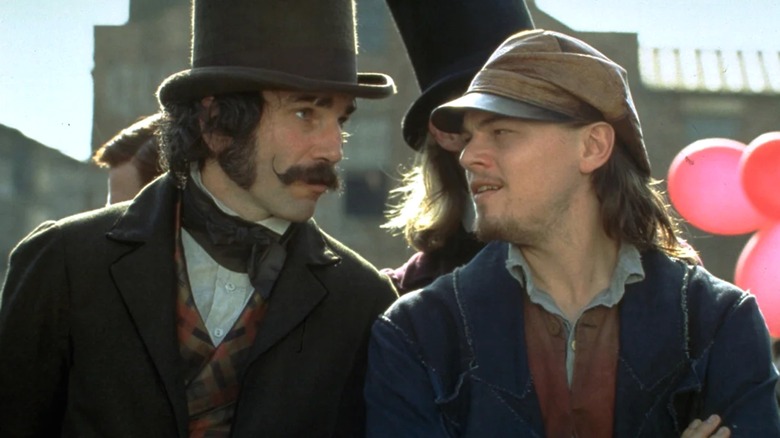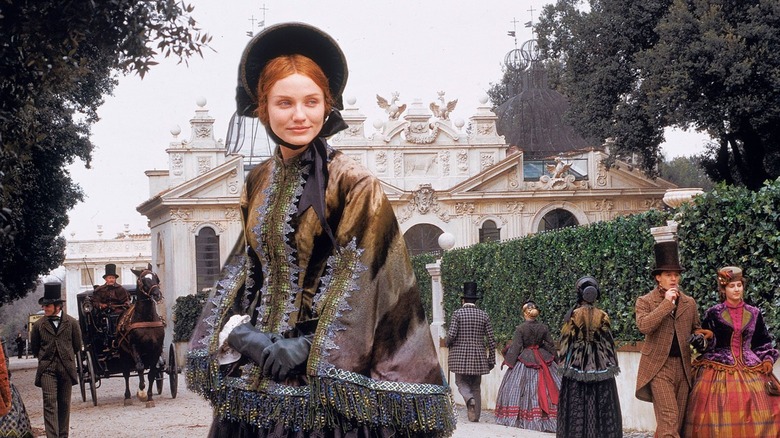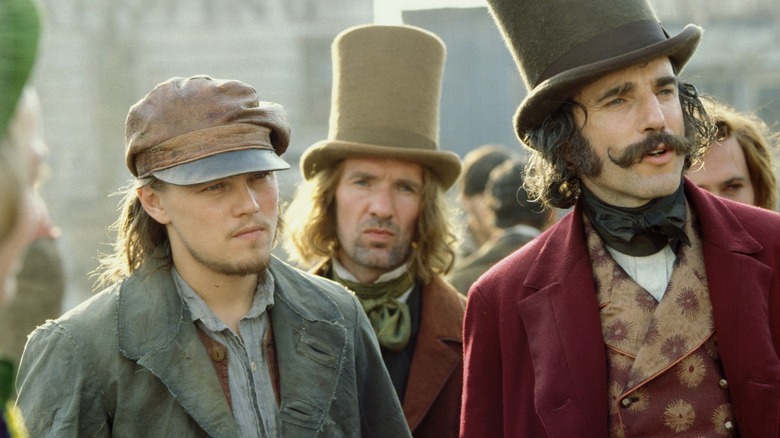Why Gangs Of New York Almost Made Martin Scorsese Quit Directing
In 1928, author Herbert Asbury published "The Gangs of New York: An Informal History of the Underworld," which rapidly became something of an underground classic. There was good reason for this: Asbury's account of the gangs of old New York was rather detailed and colorful, cobbled together with the help of myth, historical research, exaggerated first-person accounts, dodgy memory, and police records. The scope was vast too, tracing the turbulent nature of gang wars in the area that led up to the rise of the Mafia, while also providing a rogues gallery of individuals who were infamous for one reason or the other.
42 years after Asbury's book was first published, Martin Scorsese became fascinated with its subject matter, but didn't have the means to adapt it at the time. An up-and-coming director who had recently released his debut feature, Scorsese set his sights on other projects, diligently working towards cementing his name. By 1977, he had proven that his filmmaking had the juice, having helmed titles like "Mean Streets" and "Taxi Driver," which allowed him to buy the rights for Asbury's book.
The same year, a two-page ad appeared in "Daily Variety," announcing the production of "Gangs of New York," which was billed as a dramatic retelling of 19th-century New York and the gangs that were an integral part of that era. However, "Gangs of New York" wasn't released until late 2002, as it sported a complicated history of behind-the-scenes spats and multiple delays, with most of the issues revolving around a certain Harvey Weinstein.
Now, this was way before Weinstein was legally exposed for his sexual crimes, but the former co-chairman of Miramax Films already had an unsavory reputation for repeatedly exhibiting unprofessional and vindictive behavior. Weinstein's tussle with Scorsese, however, was about exercising control — while the former wanted "Gangs" to be a vapid commercial blockbuster, the latter was adamant about making sure that artistic merit triumphed over all else. Even without Weinstein's shadow looming over the film, Scorsese and his team had a lot on their plate, which turned the making of "Gangs of New York" into a long, arduous piece of filmmaking history.
The circumstances surrounding the making of Gangs of New York were dire
One might argue that for an auteur like Martin Scorsese, even films that endure severe studio interference end up being sincerely personal. After all, he is an auteur in the strictest sense of the term, having championed a distinctive visual style that bleeds beautifully into a multiplicity of themes that are emblematic of his artistic beliefs. It is not farfetched to state that "Gangs of New York" meant a lot to him, which explains why he was so passionate about doing it justice, even when the studio demanded that he and screenwriter Jay Cocks alter major parts of the story (via The Independent). While Scorsese had no choice but to make some of these changes, the rewrites still retained a fascinating mix of fact and fiction, just like Asbury's book. He also did not shy away from the reality of the 1863 Draft Riots, which were violent and turbulent enough to alter the trajectory of history and how we remember it.
You don't have to be good at math to infer how expensive this vision was, as the sets meant to signify 1860s New York had to be built from scratch. In the meantime, the project changed hands over the years, going from Universal to Disney, where the latter objected to the strong throughline of violence in the story. Moreover, Scorsese's films weren't exactly commercial successes in the U.S. at the time, as even brilliant entries like "Casino" failed to make a mark at the box office. But when Miramax, a Disney subsidiary, secured a $65 million deal for global distribution, it was clear the Weinsteins had set their sights on "Gangs" and wouldn't relinquish control over the project so easily.
Then there was the casting. Leonardo DiCaprio (who plays Amsterdam in the film) was only 16 when he heard about "Gangs" going into production, and Scorsese's decision to cast him years later kickstarted a longtime collaboration that is still going strong. Robert De Niro, another staple Scorsese collaborator, was attached at one point, but the film's troubled production led to his exit sometime in the '90s. Daniel Day-Lewis ended up filling the shoes meant for De Niro, granting the character of Bill the Butcher a menacing edge, but even this nuanced method performance underwent several iterations due to the million script rewrites that "Gangs" was subjected to. A mix of challenging prep and ever-evolving circumstances put considerable strain on the cast, who had to keep up with the whims of the higher-ups, just like Scorsese.
Scorsese was very, very close to retiring because of Gangs of New York
The Scorsese-Weinstein clash wasn't a secret at all, as major outlets covered this strained dynamic in real-time, along with how it impacted the quality of the film. A month before "Gangs of New York" was expected to premiere at Cannes, Miramax executives were pushing Scorsese to rush through final editing, as they wanted to start with sound mixing in order to meet this self-imposed deadline.
However, Scorsese wasn't satisfied with the ending and wanted to reshoot it, as Weinstein had allegedly shown up on set several times to halt the director's pace and demand arbitrary changes for no reason. There were also reports about Scorsese angrily flipping over a desk after executives wanted to make more last-minute script changes — while we have no way of knowing whether this actually happened, Scorsese's reaction is more than understandable.
In a 2023 interview with GQ, Scorsese explained how working on "Gangs" left such a bad taste in his mouth that he was almost considering never making films again (if it meant dealing with such harrowing circumstances):
"I realized that I couldn't work if I had to make films that way ever again. If that was the only way that I was able to be allowed to make films, then I'd have to stop. Because the results weren't satisfying. It was at times extremely difficult, and I wouldn't survive it. I'd be dead. And so I decided it was over, really."
Thankfully, Scorsese didn't retire, and the world is (unironically) a better place for it. The fact that Scorsese and co. were able to stand up to Weinstein since his involvement with "Gangs of New York" is nothing short of a miracle. There were several instances where such resistance was rendered futile, as Scorsese was verbally strong-armed into trimming his film amid piling expenses and aggressive executive demands. But much of this dogged determination to push for a definitive director's cut was the result of pure spite, which works best against those who wish to bully artists into making soulless cashgrabs. Although "Gangs" isn't a groundbreaking entry in Scorsese's oeuvre, its mere existence feels pretty radical, and by extension, essential.


